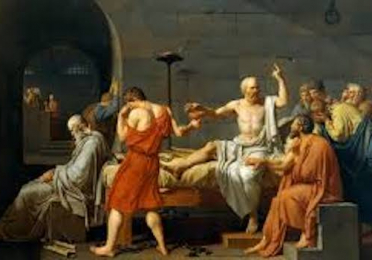- Winter 2020
Syllabus Description:
Classics 496/Honors 398
Calderwood Seminar: Public Writing in the Humanities
Shift Happens: Moving the Humanistic Conversation in the Classics from the Classroom to the Public Arena
W 2:30-4:20
CMU 228
Instructor: James J. Clauss, Department of Classics
Office: M262F Denny Hall
Office Hours: TBA
Email: jjc@uw.edu
Tel. 206 543-2266 (department office)
UW religious accommodation policy: https://registrar.washington.edu/staffandfaculty/religious-accommodation...
Course Description
Modern science and technology have so overwhelmed contemporary society that lost among terabytes and google searches is a sense of our shared humanity, a humanity that has struggled to make itself know from the beginning of recorded history only to be beaten back by the powers-that-be: wealthy oligarchs, powerful autocrats, brutal dictators, nationalistic institutions from whom the weak and the marginalized have no protection. Ancient Greek and Roman writers and thinkers observed first-hand the near impossibility of speaking to power. Their observations, demonstrate that nothing has changed except for technology, but they can help moderns see that, unless we learn from the past, we will continue to repeat mistakes, mistakes that have even greater potential for death and destruction given technological advances. During the seminar, students will examine ancient texts—literary, historical and cinematic—with the goal of learning how to communicate what we observe among the texts in various forms of public writing with the following objectives:
- To develop an ability to write with greater clarity, concision, engagement and effectiveness and to acquire editorial skills that will help you achieve this goal.
- To reflect on what constitutes effective public writing and how such writing influences our perspectives.
- To gain a greater insight into what the humanities, in particular Classical antiquity, have to contribute to contemporary discussions of the difficulty of preserving our humanity in the face of political and technological power structures.
Before the class begins, everyone should read a synopsis of the “Melian Dialogue” (https://en.wikipedia.org/wiki/Siege_of_Melos) and write a 200 word “letter to the editor” in MS Word demonstrating how the situation and mode of thinking favored by the Athenians and their violent take over of the island is worth reading as a reflection of how extreme power corrupts. Feel free to cite modern examples. Bring a hard copy to the first day of class.
Syllabus
All readings are available on-line in the Loeb Classical Library through the UW Libraryunless otherwise noted.
Week 1 Introduction to the seminar; general discussion of the beginning topic; all break up in pairs, read and comment on each others’ letters. Two groups, A and B will be formed. For the next 8 weeks when A is the author, B is the editor and vice versa. NB all participants are to read all the texts and watch both films.
Week 2 Review of Euripides’ Medea. Group A: write a 700-word review of the play, imagined as having been performed at ACT Theater Seattle. Instead of focusing on the “acting,” explain whether Euripides’ play connects with, and effectively comments on, current issues and why it is worth seeing.
Week 3 Review of Euripides’ Iphigeneia at Aulis. Group B: write a 700-word review of the play, imagined as having been performed at ACT Theater Seattle. Instead of focusing on the “acting,” explain whether Euripides’ play connects with, and effectively comments on, current issues and why it is worth seeing.
Week 4 Movie Review of The Fall of the Roman Empire(1964). All view the film and then Group A: write a 700 word movie review for the New York Times. Though an older movie, are there issues explored that resonate with the present? Is it worth seeing at this point in time?
Week 5 Movie Review of Gladiator(2000). All view the film then Group B: write a 700 word movie review for the New York Times. The film is essentially a remake of The Fall of the Roman Empire. In your review discuss whether issues explored in the film resonate with the present.
Week 6 Plato’s Apology. Group A: write a 800 word op-ed on the case against Socrates and what it teaches us about his verdict. Did the Athenian democratic judicial system get it right?
Week 7 Sallust’s War with Catiline. Group B: write a 800 word op-ed on whether the bitter divisiveness and raging anger seen among the Romans parallels the current political scene in the US and, if so, where it suggests we might be going.
Week 8 The Iliad. Read the summary at https://www.ancient-literature.com/greece_homer_iliad.htmland Book 1 at http://www.perseus.tufts.edu/hopper/text?doc=Perseus%3Atext%3A1999.01.0134%3Abook%3D1%3Acard%3D1. Group A: write an oral presentation (800 words), imagined as a TED talk, on the havoc that the personal anger of the most powerful wreaks on all in their community/society, an issue at the heart of the Iliad. What insight does this story give us into the current state of affairs?
Week 9 The Aeneid. Read the summary at https://en.wikipedia.org/wiki/Aeneidand Book 4 at https://www.theoi.com/Text/VirgilAeneid4.html. Group B: write an oral presentation (800 words), imagined as a TED talk, on the relevance of the Aeneidin modern society, focusing in particular on the perceived need of an individual to give up every aspect of his personal life in service of the state.
Week 10 Final reflective piece for all students: compose an elevator speech in which you have 5 minutes to persuade Bill Gates to make a major contribution to the Department of Classics at the UW because of the importance of Classical literature in the understanding of the human condition and the empathy that such understanding generates. These will be delivered in class on the final day.
Rules of Engagement
Each piece of writing will go through a five-stage cycle:
- First drafts by writers that will be read and edited by assigned editors.
- Annotated drafts by editors that will be read and revised by writers.
Each week writers and editors will establish mutually-agreeable deadlines for exchanging drafts. Edits should be returned to writers to allow sufficient time for redrafting before the Tuesday deadline (Noon).
- Revised drafts by writers are due no later thanNoon on Tuesday. At this point all members of the class will read all revised drafts in preparation for discussion and workshopping on Wednesday.
- Revised drafts will be workshopped in class on Wednesday afternoon. Everyone should come prepared to discuss all drafts written for each class. Each class will consist of a warm up period (e.g., What did you learn from the process of rewriting? What was challenging? How did you make use of what you learned in previous courses or from new resources? Did this exercise give you insight into the material you wrote about?), a review of the central points made in the material at issue, and review of the individual drafts.
- Final drafts by writers are due in class the following Wednesday.
All writing should be done in Word, and editors should use the track changes and comment functions for their annotations. Editors should also write one or two paragraphs at the end of each piece with a general assessment of the strengths and weaknesses of the draft and how it might be improved. All writing should be given titles by the author (editors may comment on these), and word counts should be placed at the end of the piece. Use a 12-point font, double spacing, standard margins and page numbers.
Grades
I will read and comment on all first (Tuesday) AND second (following Wednesday) drafts to which grades will be assigned. Editors will send me annotated drafts at the same time as they are sent to the author (ungraded). Your final grade in the class will take these graded drafts into account but will also reflect other forms of engagement with the course, such as class preparation, attendance, participation in class discussions, and the editing process.
Important UW policy-related things to know:
- The UW's Religious Accommodations Policy:“Washington state law requires that UW develop a policy for accommodation of student absences or significant hardship due to reasons of faith or conscience, or for organized religious activities. The UW’s policy, including more information about how to request an accommodation, is available at Religious Accommodations Policy (Links to an external site.). Accommodations must be requested within the first two weeks of this course using the Religious Accommodations Request form (Links to an external site.).”
- The UW's Student Conduct Code: "The University of Washington Student Conduct Code (WAC 478-121) defines prohibited academic and behavioral conduct and describes how the University holds students accountable as they pursue their academic goals. Allegations of misconduct by students may be referred to the appropriate campus office for investigation and resolution. More information can be found online at https://www.washington.edu/studentconduct/."(Links to an external site.)
- Access and Accommodation: Your experience in this class is important to me. If you have already established accommodations with Disability Resources for Students (DRS), please communicate your approved accommodations to me at your earliest convenience so we can discuss your needs in this course.
If you have not yet established services through DRS, but have a temporary health condition or permanent disability that requires accommodations (conditions include but not limited to; mental health, attention-related, learning, vision, hearing, physical or health impacts), you are welcome to contact DRS at 206-543-8924 or uwdrs@uw.edu or disability.uw.edu. (Links to an external site.)DRS offers resources and coordinates reasonable accommodations for students with disabilities and/or temporary health conditions. Reasonable accommodations are established through an interactive process between you, your instructor(s) and DRS. It is the policy and practice of the University of Washington to create inclusive and accessible learning environments consistent with federal and state law.
- Academic Integrity: University of Washington students are expected to practice high standards of academic and professional honesty and integrity as outlined here:http://depts.washington.edu/grading/pdf/AcademicResponsibility.pdf (Links to an external site.)

